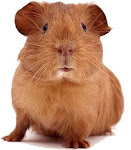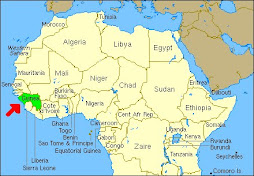Politics.
So, here’s a brief update on the situation. We are all hoping that “Our Malian Hero,” the recently appointed president of Guinea’s electoral commission will be able to make the promised presidential elections happen. They were scheduled for yesterday, Sunday October 24. Friday night we found out that elections will be postponed indefinitely. And so we continue to wait and hope.
As for me, I’m currently in limbo. I’m eager to get to my post and begin the job I signed up to do, but that won't be possible until after the elections have passed. Given the uncertainty I’m examining all my options: wait indefinitely for the potential to do good work here in Guinea, transfer to another country where Peace Corps can offer me equally viable short-term work, start looking for a job elsewhere... For so long I’ve been looking forward to this opportunity in Guinea that it would be difficult to let it slip away. Mentally, I’m not quite ready to come back to America and settle in to the day to day routine that ultimately awaits me. Not that the settled American life is a bad thing, and I do look forward to it, eventually. I was just banking on my six more months of doing fulfilling work in Africa. I’ve found it’s hard to tear myself away from here.
The home life.
So in the interim, I’ll tell you a little about what I’m up to! I’m staying with a Guinean family. (That was a surprise when I got off the plane! Washington had told me that I’d be working at my site within about four days of my arrival, after a quick orientation in Conakry.) So, it’s taken a little adapting, but I appreciate the fam. My Ma feeds me well, and I love that she’s always laughing. Not in a creepy way, the way some people laugh at completely inappropriate moments, but in a way that puts everyone at ease because she’s just generally a happy and amused old woman. My brother’s name is Mohamed Sowpith Camara, but everyone calls him Ally. And he is a good ally indeed. He keeps me informed of all the current news, shares my dinners with me, and shows me around town. They’re part of a polygamous family. The father, now deceased, had three wives and nineteen children. There are so many kids running around my compound that there’s no way I can keep them all straight! My Ma speaks some French, and her children are well educated; several have been to college, which is rare and surprising here.
And since I KNOW my American Mom is going to ask, I’ll tell you what we eat here. :) Out of my deep-seated fear of tripe, liver, and other unidentifiable organs, I told Ma that I don’t like meat. So, lucky me, I eat loads of fish, which I love! It helps being right near the water. Not only that, but one day I was eating an omelet Ma made me for breakfast that I could have sworn had crab in it. Lo and behold. Crabs are everywhere here! Ma mixes them in a dish called “riz gras.” Fat rice. It’s Guinea’s answer to Louisiana’s dirty rice or jambalaya. And randomly, I eat a LOT of pumpkin! It is the chosen vegetable of my household, apparently. Fine by me!
Dubreka, the town where all of us PCVs are staying until after elections, is about 50 km outside Conakry. Dubreka has no water and no power on a regular basis. Indeed, my toilet is a hole in the ground. Cameroon sure spoiled me with those porcelain wonders. If you’re curious, that’s my toilet there. (Stand on the feet, lift up the cement plug, aim.)

And here’s my shower. Before starting, ensure there is enough water, and then cup by cup, wash yourself clean! (The hardest part to rinse is your forearms.) Don’t worry, I never have to shower alone. Plenty of arachnids just line up to keep me company!

The Peace Corps training facility has a generator, so they fire that up for a few hours of electricity a day. I’ve been entertaining myself with lots of reading on microfinance, runs, and bike rides through the jungle-y scenery. It’s at least as brutally humid here as in South Louisiana in the summer, so another of my preferred activities is fanning myself in the dark at night. At least the humidity brings forth lush, beautiful greenery in all directions, which I do appreciate! (Between the drops of sweat that roll down my eyes!)
I’ve had the chance to do and see some neat things here in Dubreka. First, some traditional tea. If I had better internet access, I’d upload the video that accompanies these photos. Abdoulaye, our 17-year-old tea maker extraordinaire, got his hands on another volunteer’s iPod. Apparently, the ubiquitous Cameroonian-man-falsetto singing voice extends throughout West Africa. I have never met an African man who sings in anything other that a squeaky high warble. Here, he’s belting out Rihanna’s “Umbrella,” distinguishable by high-pitched wailing interspersed with the occasional lyrical burst, “Umbrella, brella! Hey! Hey!” His tea is very good.
Concentration.

Really, he could do this with his eyes closed.

They pour it from one cup to another to cool it off, after it’s steeped on the hot coals.
The finished product is really sugary and very strong—like a shot of tea. Sometimes, interestingly, they add peanuts into the tea.

Then, we got in touch with a local organization that teaches kids drumming and dancing. The organization, funded in part by UNICEF, also teaches the kids to read, write, do some basic math, and provides a meal per day.
I saw so surprisingly little drumming and dancing in Cameroon (except when I asked for demonstrations in my own living room, see below) that I was thrilled to see this so soon into my stay in Guinea.



A traditional Mafa dance of Northern Cameroon, as portrayed in my living room.

And lastly, I’ll leave you with a classic concept: the Guinean clothes dryer!

So, please keep your fingers crossed, and if you’re the praying type, say some prayers for Guinea—that these elections will happen and that Guinea can move out of its limbo and forward into something new and good.


